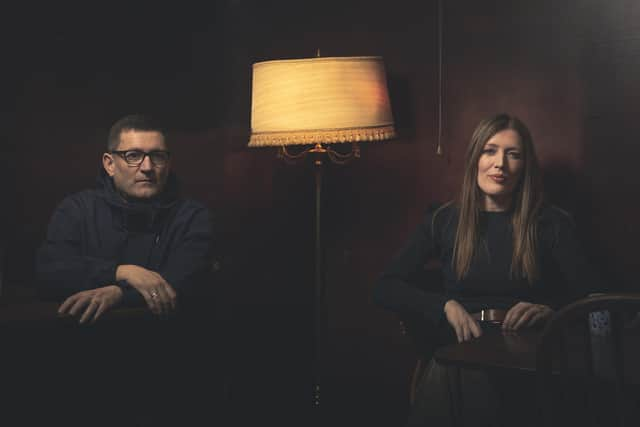Album reviews: Bjork | Paul Heaton & Jacqui Abbott | Courtney Marie Andrews


Bjork: Fossora (One Little Independent) ****
Paul Heaton & Jacqui Abbott: N.K-Pop (EMI) ***
Courtney Marie Andrews: Loose Future (Fat Possum) ****
Reconnecting with home and family have been two great themes of the pandemic – not that Bjork lacked connection before, but she has dubbed her tenth studio work as her “Iceland album”, much of it created through lockdown when she returned to her homeland. It is certainly a family affair with vocal contributions from son Sindri and daughter Isadora and two songs, Sorrowful Soil and Ancestress, inspired by her activist mother, Hildur Runa Hauksdottir, who died in 2018.
As before, Bjork has entire orchestras at her disposal but tends to favour a section in turn. Atopos is an impish patchwork of drums, clarinet ensemble and voice which becomes ever more insistent and frenetic. Next, it’s trombone and timpani time on Ovule, a poetic meditation on finding love after heartbreak, while the flutter of cor anglais garnishes the beautiful requiem Her Mother’s House.
Advertisement
Hide AdAdvertisement
Hide AdBut it’s not all heartache and mourning. The flute orchestra with which she toured previous album Utopia provides a spring in the step on Allow. Once more, Bjork is literally in her element, exulting in the environment. On Fungal City, she equates the sensuality of nature with her relationship.
Fossora is also laced with non-acoustic interludes. Mycelia is a programmed piece carved from samples and wordless, pitch-shifted vocals, Victimhood is a tectonic rumble of brooding electronica, while the evocatively named Trolla-Gabba is a collage of industrial noise and polyphonic humming, as idiosyncratic and seductive as anything in her back catalogue.


Paul Heaton recently celebrated his 60th birthday by putting a £1,000 tab behind the bar at 60 pubs throughout the country – one cherished British institution propping up another in times of trouble. The title of Heaton’s latest album with musical foil Jacqui Abbott refers to their North Korean spin on K-Pop – as it turns out, this involves more of their usual breezy pub pop with compassionate or caustic lyrics on (broken) relationships.
Heaton ponders the pain of obsolescence on When the World Would Actually Listen, which could be a little bit K-Pop if you squint the right way. I Drove Her Away with My Tears is a country song in upbeat pop clothing, while the skiffly I Ain’t Going Nowhere is a jaunty exorcism of lockdown times.
There is a quirky, eloquent perspective around every corner. The Good Times charts the life, times and demise of a pub landlady, killed by the culture she upholds; Baby It’s Cold Inside is a riposte to the male entitlement of Baby It’s Cold Outside; and My Mother’s Womb is a knees-up celebration of the outspokenness Heaton inherited from his mum, and a lament for the current dearth of debate. Still is a heartbreaker about the death of an infant, penned in hopes of encouraging bereaved parents to talk about their loss, while Sunny Side Up and His Master’s Game target division sewn by, respectively, right-wing media and political leaders.
Courtney Marie Andrews is one of the most accomplished, graceful Americana voices to emerge in recent years. There may be some angst in her lyrics but musically Loose Future is a gentle, effortless album suffused with sincerity and subtle humour. The title track is a plea for caution in love with a twist in the telling, Older Now was inspired by an awkward date and celebrates the maturity in not holding on to what isn’t working, while On the Line takes unsentimental snapshots of a one-sided relationship. On the flipside, Satellite revels in the quiet ecstasy of stellar love and Me and Jerry is a song of sexual rapture.


These Are the Good Old Days is Lana Del Rey in a country state of mind, celebrating classic Americana imagery, while I’ll Be Thinkin’ On You stands out in an uncluttered collection with its lush Nashville sound.
CLASSICAL
Hollywood Soundstage (Chandos) *****
Advertisement
Hide AdAdvertisement
Hide AdOnce again, John Wilson scores a nostalgic hit thanks to his abiding passion for the great Hollywood soundtracks. The instruments of that passion are his own personally-picked musicians from the Sinfonia of London. Opening with Korngold’s ripe and fulsome Overture from the 1939 film The Private Lives of Elizabeth and Essex, Wilson sets a tone of gloriously unadulterated opulence, music overflowing with ravishing romanticism. Emotions erupt in every direction in the stream of hits that follow: the intoxicating ebb flow of Raksin’s 1944 Theme from Laura; the wild extremes of Stothart’s and Arlen’s Suite from The Wizard of Oz; plus classics from the pens of Frederick Loewe, Max Steiner, Johnny Mandel (the gorgeous 1960s laid-back Title from The Sandpiper) and Franz Waxman’s Rebecca suite. Wilson ends with Alfred Newman’s Street Scene from How to Marry a Millionaire, where every golden trick in the Hollywood music manual is mercilessly exploited. Ken Walton
FOLK
Siskin Quartet: Flight Paths (Eighth Nerve Audio) ****
The siskin is a pretty little finch native to Scotland, but it is also migratory between here and Scandinavia. An apposite name, therefore, for this quartet, combining the Norwegian-based Scots-Finnish duo of fiddler Sarah-Jane Summers and guitarist Juhani Silvola and the Anglo-Swedish pairing of fiddler Bridget Marsden and accordionist Leif Ottosson. They’ve themed their album around migratory birds and, musically, they’re pretty high flyers themselves, right from Summers’s opening composition, The Peewit, as it captures the airy energy of the bird tumbling about the sky, while their titular Siskin reel is chirpily vivacious. Silvola’s electric guitar adds a Richard Thompson-ish twang to the rich string and reed strains of Ottosson’s waltz Midnattssol, reedy sighs and Hardanger-like fiddle inform Marsden’s haunting Morning Green before we’re borne off, startlingly, to the desert blues reverb of Firefinch and, finally, the inexorable sea drift and wordless vocal chorus of Albatrossi. Jim Gilchrist